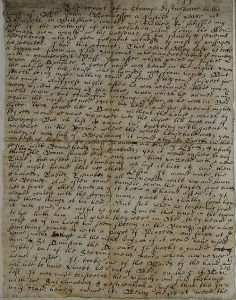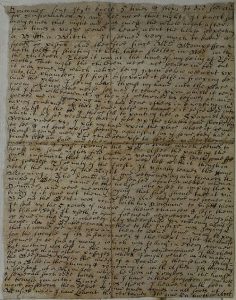Wife and girl and I alone at dinner – a good Christmas dinner, and all the afternoon at home, my wife reading to me ‘The History of the Drummer of Mr. Mompesson’, which is a strange story of spirits, and worth reading indeed.
The Diary of Samuel Pepys, 25 December 1667
What could be more cosily festive than settling down after a good Christmas dinner to listen to a ghost story as darkness falls outside? This Christmas Day will mark 350 years exactly since Samuel Pepys did just that, his wife Elizabeth reading to him the strange tale of a ghostly drummer said to have haunted a family home in Wiltshire a few years previously.
The story was one of spiritual vengeance – after punishing an ‘idle vagrant’ by confiscating his drum, magistrate Mr John Mompesson had his household bombarded with nuisances of an apparently spiritual nature: unexplained knockings and drumming noises, foul smells, dancing furniture and many other troubling but harmless occurrences that pestered the family for months. The story became renowned, with hordes of visitors apparently descending on the house in hopes of witnessing the supernatural mischief.
Here at The National Archives, tucked away in the State Papers, is a first-hand account of some of the events that took place in the house in Tedworth (now Tidworth) in the early 1660s. This small and innocuous-looking letter, undated and unsigned, was written by an unknown person who had visited the house to witness the disturbances first hand.
- SP 29/230 f125
- SP 29/230 f125
The letter relates some of the strange and unexplained events that were reported to have taken place in the house, beginning with unexplained nocturnal noises which alarmed the family, and presently the sound of a beating drum that moved from outside to within the house. The drumming continued there, playing contemporary tunes and military tattoos and even taking requests from the assembled spectators.
After this the activity became more dramatic and physical – furniture dancing and throwing itself down the stairs and servants being ‘pluck’d out of bed’ and having objects thrown at them. The events the letter writer actually witnessed are slightly more low-key: shapes moving beneath bed covers, scratching and panting noises, and so on. Interestingly, these events took place in the bed of the children (where the ghost had apparently taken refuge) which would lead the more sceptical among us to suspect the children themselves might be the source.
- ‘The report of a strange disturbance’
- ‘soe sulphurous & pestilentiall a smell’
- ‘It was more boisterous than usually’
The case bears striking resemblance to the later and hugely publicised ‘haunting’ that took place in London’s Cock Lane in 1762, during which some of the greatest minds in London were baffled by scratching sounds and rapped-out ghostly communications issuing from the bed of a child, and which caused much embarrassment when exposed as a fraud.
The story of the Tedworth drummer was included by writer and philosopher Joseph Glanvil in his 1668 work ‘A Blow at Modern Sadducism’, ostensibly a compendium of supernatural incidents put down in defence of the existence of spirits, ghosts and witchcraft. This cemented the story’s place in the canon of documented supernatural incidents, and it has been cited by believers as an early example of poltergeist activity since then.
On a personal level, I find everything about this letter appealing – the tiny size (19 x 15cm), the cramped and spidery handwriting – but most of all the glimpse it gives us into the curiosity felt by those in centuries gone by into the unexplained. Scepticism, rationality and science are so firmly entrenched in our modern lives that it is easy to forget that those who went before us led existences far more fragile and full of doubts.
Why not re-live the experience that the Pepys’ enjoyed that Christmas Day in 1667, and see if 350 years has made the story any less worth reading than Samuel himself found it?
‘The report of a strange disturbance in the house of Mr John Mompesson a justice of peace at Tedworth in Wiltshire, invited me thither to satisfie my selfe of the certainty of the relation, and from the Gentlemans own mouth in the presence of his family & severall neighbours who had been frequent witnesses of most of passages he related, I had this account; That about May last he took
a drumme from an Idle vagrant who wandred about ye country with a counterfeit Pass. Soon after which peice of justice upon the Drummer a great noise was heard in the night upon the outside of the house when himself was from home; But search being made nothing could be could be found yt they could suspect for the cause. And ye first night after he was returned there was a very violent bouncing at the doore; upon which he armed and went down, but could find nothing. As soon as he was in Bed again the noise seemed over his head; and for severall nights after ‘twas heard like a Drum without the house, which by degrees would remove upwards into the Ayre til twas out of hearing. But at last it came in, knocking with great violence in the Roome where the whole household was; yea when it was full of Neighbours it would play its Tricks in the middst of them, It would Drum all kind of Lessons, & usually begin with Roundheads and Cuckolds; yea it would answer to any thing any in the Room should beat. only once twas puzeled with a new Tune, but after long blundring at last it hitt it and then that night twould beat noe other Lesson. It would make the Chairs, Tables Trunks & all moveables walk up and down the Roomes. And often come tumble down the stayres some times like a bowle & other times as if it drew Chains after it., It would contest with the serving man, pluck his cloaths from him and throw things at his head, But still when he tooke his sword it was gone, one night he got a Smith that lived in the town to lye with him. And when they were in Bed they heard a noise as if an horse had been shooing in the Roome; after which something comes as with a payre of Pincers and snips at ye poore smith’s Nose all the night long, as if it would have used his as St Dunstan the D. once. It snacht a candle out of lighted out of the serving mans hand, which was never heard of after, It tooke one of the Maids by the hand and had like to have pluckt her out of Bed. on the 5 of Nov. last It was more boisterous than usually, and fild the house with soe Sulphurous & pestilentiall a smell that the family could hardly indure it. Being bid, if it were the Drummer sent It, to knock 5 times & stop, It did soe. And for confirmation 7, and noe more that night; It knoct soe many times that night and was quiet the whole night after. Some times a voice would be heard about the house repeating a Witch a Witch. It seemed very much to dread a sword or pistol And therefore since Mr Mompesson hath talkt of shooting it hath taken shelter in Bed with the children, There it was at this time of my being at Tedworth. That night the children were no sooner in bed but it was come, of which notice being given below wee went up into the chamber; It first discovered it selfe in scraping behind the pillow I being neare thrust my hand into the place from whence the noise seemed to come, upon which it ceased till I had withdrawn it; & then it returned as before; it answered me in scraping as it had done others in knocking. And having continued at that Trade halfe an houre, it descended into the midst of the bed & there fell to panting like a Spanniel dogge which it did soe violently that it tore up the cloaths and shook the Roome under us, I put my hand upon the place where it seemed to bee & it bore up soe strongly against it as if some body had thrust against mee. The children use to feel it so under them sometimes like an Eale and other times like a bowle which seemes to make a hole & pass through the Bed. After the panting the house was some nights fild with a very strong & loathsome smell insomuch that the chamber was hot with it though in
the greatest extremity of the frost. It usually leaves the House about the middle of the Night and returns again towards the Morning. The drumming had seased about a weeke when a couple of Gent. came to the house who used to imploy the Drummer, and were merrily saying that they should take it unkindly if it gave not them a Lesson; And they were noe sooner in Bed but the Gent. was come with his Drumme to visit them. It beat up the 5 points of warre in theire chamber & left them to theire Rest, It useth to have frequent references to things sayd or done in the day, hereby they understand ‘tis commonly about ye house. An old Gentlewoman mother to the justice was saying that it would doe well now and then to leave some mony to pay for the trouble of its disturbance; & the next night the house seemed to be full of mony, which was falling in every corner but nothing was left in the morning but ye remembrance of the cheat there are many other passages which I might relate as its making the Bedstaves play in the midst of a Roome by themselves. Its laying a Bible in the chimney & returning it with Ashes. Its throwing a bedstaff at a Minister while he was at prayers in the house & severall such odde tricks which I have either forgotten of am loth to trouble you with. Since I was there I heard it hath been more boisterous than before & some times comes in all sorts of Musick when I have Learnt the certainty Ile give yu a further Acct.’
In transcribing this letter I made liberal use of the palaeography resources available on our website, which were extremely helpful and really satisfying to work through, particularly for a novice such as myself – you can find them here.





I worked there in 1992 and we had a function in the bottom dinning room so we had to take take things down to the bottom kitchen. When I was on my own clearing the dinning room I looked at the 2 glass panels in the doors leading to the kitchen and I seen a lady stood there with a white frilly hat on and a while ruffled neck. I was so scared I ran to the the officers quarters and asked a member of staff to come back with me to gather the plates. As we did it was ok until we put them back on the shelf and they started to fly off one by one. Never forget it.